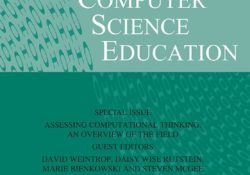eric.ed.gov har udgivet: This case study presents a descriptive portrait of how one general mathematics teacher transformed her classes from a computational to a conceptual orientation. The outcomes of the transformation for student learning and instruction are discussed. The findings suggest student gains in computational competence, mathematical effort, and attitude via concept-oriented instruction exceeded notably the gains of students in other classes where instruction was computationally oriented. The study employed field-research methods including observations, interviews, and the collection of student data across the project’s three years to capture and describe the nature and effects of the instructional interventions. At the end of the intervention period, students and instruction were organized in ways that focused student interest, attention, and involvement on the learning of mathematics. Many illustrative segments of classroom interactions… Continue Reading →
Like this:
Like Loading...
tandfonline.com har udgivet en rapport under søgningen “Teacher Education Mathematics”: Link til kilde
Like this:
Like Loading...
tandfonline.com har udgivet en rapport under søgningen “Teacher Education Mathematics”: ABSTRACT ABSTRACT There is considerable debate and ambiguity around what constitutes “computational thinking” (CT). In contrast to Computer Science which is generally treated as a distinct field of study, CT as a construct highlights the integral relationship between computing and other fields. Many recent efforts seek to map computational thinking by making high-level connections to other school disciplines. We argue that while these efforts may help identify specific curricular areas in which computing is likely to take place, they do not sufficiently capture the specificity and dynamism that is characteristic of meaningful computational integration. Worse, they exclude generative examples of computing integration that exist outside of the traditional STEM context or researcher-led efforts. In this special issue, we offer a… Continue Reading →
Like this:
Like Loading...
tandfonline.com har udgivet en rapport under søgningen “Teacher Education Mathematics”: Link til kilde
Like this:
Like Loading...
eric.ed.gov har udgivet: Computational thinking is a way of thinking that covers 21st century skills and includes new generation concepts such as robotics, coding, informatics and information construction. Computational thinking has reached an important point especially in the field of science in line with the rapid developments in technology. Robotics applications, software-based activities, STEM (Science, Technology, Engineering, Math) education and problem-based studies are some of the areas where this thinking is used. In this study, which is based on this point, it is aimed to develop a scale for computational thinking. Exploratory sequential design, one of the mixed research methods, was used in the study. First of all, a detailed literature review was conducted and needs analysis was carried out. This study consists of two stages. In the first stage,… Continue Reading →
Like this:
Like Loading...
tandfonline.com har udgivet en rapport under søgningen “Teacher Education Mathematics”: ABSTRACT ABSTRACT Teachers around the world have started teaching programming at the K-9 level, some due to the formal introduction of programming in the national curriculum, others without such pressure and on their own initiative. In this study, we attempted to understand which skills – both CT-related and general – are developed among pupils in the process of working with programming in schools. To do so, we interviewed 19 Swedish teachers who had been teaching programming for a couple of years on their own initiative. The teachers were selected based on their experience in teaching programming. Our thematic analysis of these interviews shed light on what skills teachers perceive pupils develop when programming. This led us to identify three themes… Continue Reading →
Like this:
Like Loading...
tandfonline.com har udgivet en rapport under søgningen “Teacher Education Mathematics”: Link til kilde
Like this:
Like Loading...
tandfonline.com har udgivet en rapport under søgningen “Teacher Education Mathematics”: Bodygramming. Embodying the computational behaviour as a collective effort Link til kilde
Like this:
Like Loading...
tandfonline.com har udgivet en rapport under søgningen “Teacher Education Mathematics”: Link til kilde
Like this:
Like Loading...
eric.ed.gov har udgivet: This article presents a new paradigm for the study of Math and Sciences curriculum during primary and secondary education. A workshop for Education undergraduates at four different campuses (n = 242) was designed to introduce participants to the new paradigm. In order to make a qualitative analysis of the current school methodologies in mathematics, participants were introduced to a taxonomic tool for the description of K-12 Math problems. The tool allows the identification, decomposition and description of Type-A problems, the characteristic ones in the traditional curriculum, and of Type-B problems in the new paradigm. The workshops culminated with a set of surveys where participants were asked to assess both the current and the new proposed paradigms. The surveys in this study revealed that according to the majority… Continue Reading →
Like this:
Like Loading...






